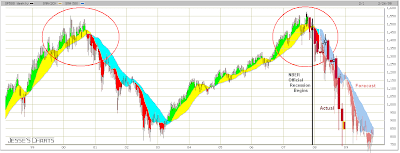"Denial is the most predictable of all human responses. But, rest assured, this will be the sixth time we have destroyed it, and we have become exceedingly efficient at it."
The Architect of the Matrix
We have an hypothesis that what is learned from this series of financial crises, from 2000 to 2012, and the failure of the dollar reserve currency experiment, is going give rise to a new school of economics as the Great Depression lifted Keynesianism over classical economics, and the bear market and stagflation of the 1970's sparked the ascendancy of monetarism.
2009 is going to be a pivotal, volatile year, and most likely, interesting.
The Financial Times
UN team warns of hard landing for dollar
By Harvey Morris in New York
December 1 2008 08:48
The current strength of the dollar is temporary and the US currency risks a hard landing in 2009, according to a team of United Nations economists who foresaw a year ago that a US downturn would bring the global economy to a near standstill.
In their annual report on the world economy published on Monday, the economists said the dollar’s sharp rebound this autumn had been driven mainly by a flight to the safety of the international reserve currency as the financial crisis spread beyond the US.
The overall trend remained a downward one, however, reflecting perceptions that the US debt position was approaching unsustainable levels. An accelerated fall of the dollar could bring new turmoil to financial markets.
“Investors might renew their flight to safety, though this time away from dollar-denominated assets, thereby forcing the US economy into a hard landing and pulling the global economy into a deeper recession,” the report said.
Publication of the annual survey by the UN’s Department of Economic and Social Affairs, its trade organisation Unctad and UN regional bodies, was brought forward by a month in the light of the financial crisis. It was launched in Doha to coincide with the UN-sponsored development financing conference in the Qatari capital.
 The UN team said that, as the financial crisis spread beyond the US, there had been a massive shift of global financial assets into US Treasury bills, driving their yields almost to zero and pushing the dollar sharply higher. At the same time, however, the US’s external debt had risen to new heights that could provoke a dollar collapse.
The UN team said that, as the financial crisis spread beyond the US, there had been a massive shift of global financial assets into US Treasury bills, driving their yields almost to zero and pushing the dollar sharply higher. At the same time, however, the US’s external debt had risen to new heights that could provoke a dollar collapse. The report recommends reform of the international reserve system away from almost exclusive reliance on the dollar and towards a globally backed multi-currency system.
Rob Vos, a Dutch economist who heads the UN’s policy and analysis division and who is responsible for the annual economic review, said the global economic pain could be eased if governments co-ordinated a spate of stimulus packages that were already under way.
“There has been a sea change in attitudes in favour of intervention and concerted action,” he told the Financial Times. He welcomed statements from US president-elect Barack Obama’s transition team in support of spending on infrastructure.


































